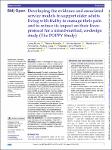Developing the evidence and associated service models to support older adults living with frailty to manage their pain and to reduce its impact on their lives: protocol for a mixed-method, co-design study (The POPPY Study)
| dc.contributor.author | Foster, A | |
| dc.contributor.author | Brown, L | |
| dc.contributor.author | Schofield, P | |
| dc.date.accessioned | 2023-06-27T09:39:50Z | |
| dc.date.available | 2023-06-27T09:39:50Z | |
| dc.date.issued | 2023-06-26 | |
| dc.identifier.issn | 2044-6055 | |
| dc.identifier.issn | 2044-6055 | |
| dc.identifier.uri | https://pearl.plymouth.ac.uk/handle/10026.1/21005 | |
| dc.description.abstract |
Introduction The Pain in Older People with Frailty Study is a mixed-method, co-design study, which aims to develop the content, implementation strategies, service and professional guidance to support older adults with frailty to manage their pain. Methods and analysis The study has four phases: Phase 1, research evidence and information synthesis from randomised controlled trials of multicomponent pain management programmes and psychological therapies for community-dwelling older adults. Phase 2, qualitative interviews with 30 community-dwelling older adults (≥75 years) living with frailty and persistent pain, including dyadic interviews with a spouse or unpaid carer. Phase 3, qualitative interviews with healthcare professionals (HCPs) working within various pain service types; 5–8 HCPs per service and up to 12 services including primary care, secondary care, tertiary centres and services with voluntary sector input. Phase 4, co-design workshops with older adults, HCPs and commissioners. Inclusion criteria (Phase 2): community-dwelling older adults (≥75 years) living with frailty and persistent pain. Exclusion criteria (Phase 2): care home residents, a dementia or cancer diagnosis. Cancer survivors, ≥5 years cancer free, and not undergoing active cancer treatment can participate. Analysis for Phase 1 will use narrative synthesis, Phase 2 will use grounded theory analysis and Phase 3 will use thematic analysis. Oversight is provided from a patient and public involvement group and an independent steering committee. Ethics and dissemination The protocol was approved by Leeds-East Research Ethics Committee on 28 April 2022 (22/YH/0080). Consent is sought if an individual is willing to participate (Phases 2–4) and has capacity. Findings will be disseminated at conferences, in newsletters and journals and to local authorities and charities. | |
| dc.format.extent | e074785-e074785 | |
| dc.format.medium | Electronic | |
| dc.language | en | |
| dc.publisher | BMJ Publishing Group | |
| dc.subject | pain management | |
| dc.subject | aging | |
| dc.subject | chronic pain | |
| dc.title | Developing the evidence and associated service models to support older adults living with frailty to manage their pain and to reduce its impact on their lives: protocol for a mixed-method, co-design study (The POPPY Study) | |
| dc.type | journal-article | |
| dc.type | Article | |
| plymouth.author-url | https://www.ncbi.nlm.nih.gov/pubmed/37369419 | |
| plymouth.issue | 6 | |
| plymouth.volume | 13 | |
| plymouth.publisher-url | http://dx.doi.org/10.1136/bmjopen-2023-074785 | |
| plymouth.publication-status | Published | |
| plymouth.journal | BMJ Open | |
| dc.identifier.doi | 10.1136/bmjopen-2023-074785 | |
| plymouth.organisational-group | |Plymouth | |
| plymouth.organisational-group | |Plymouth|Research Groups | |
| plymouth.organisational-group | |Plymouth|Faculty of Health | |
| plymouth.organisational-group | |Plymouth|Faculty of Health|School of Nursing and Midwifery | |
| plymouth.organisational-group | |Plymouth|Users by role | |
| plymouth.organisational-group | |Plymouth|Users by role|Academics | |
| plymouth.organisational-group | |Plymouth|Research Groups|Plymouth Institute of Health and Care Research (PIHR) | |
| dc.publisher.place | England | |
| dcterms.dateAccepted | 2023-06-05 | |
| dc.date.updated | 2023-06-27T09:39:50Z | |
| dc.rights.embargodate | 2023-6-28 | |
| dc.identifier.eissn | 2044-6055 | |
| dc.rights.embargoperiod | forever | |
| rioxxterms.versionofrecord | 10.1136/bmjopen-2023-074785 |


